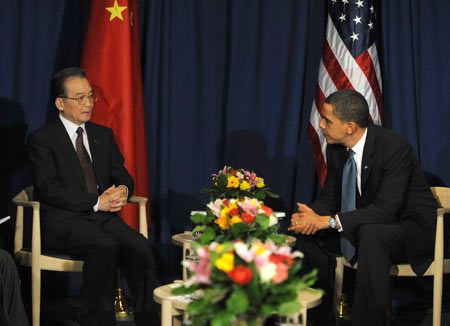Endeavors to build global hope: Chinese premier's 60 hours in Copenhagen
LAST MINUTE EFFORT
After U.S. President Barack Obama's speech, Premier Wen held talks with him in a meeting room just behind the summit venue.
The two leaders agreed that the participating countries of the conference should achieve a political resolution as soon as possible and continue cooperation on climate change.
 |
|
Chinese Premier Wen Jiabao (L) meets with U.S. President Barack Obama in Copenhagen, Denmark, Dec. 18, 2009. [Liu Jiansheng/Xinhua] |
During the conference, similar situations occurred when some countries proposed a draft resolution through clandestine negotiations, which went against the principle of openness and transparency and triggered strong discontent.
Premier Wen took the incident seriously and came back to his hotel immediately to call an emergent meeting to study countermeasures for the situation.
As soon as the talks ended, Wen asked members of the Chinese delegation to inform the Group of 77 and other BASIC countries of the Sino-American talks, aiming to speed up negotiations between developing and developed countries.
Developing and developed countries discussed the final document, but failed to make any progress as a result of divergence of views, even when the Copenhagen climate change conference was scheduled to conclude hours earlier.
Some countries were drafting announcement of the conference's possible failure, and certain foreign leaders even made irresponsible criticism against China.
At the Bella Center, the venue of the conference, journalists started to pack luggage. People around the world were wondering how and when the Danish government would declare failure of the largest and highest level climate change conference ever in human history.
It was Premier Wen who played a key role in the last-minute attempt to exchange ideas and reach consensus.
Wen believed that it was impossible to reach a legally binding agreement at that time, while no country was willing to be responsible for the failure if the conference yielded no result in the end.
"As long as there is hope of one percent, we should not give up and must instead make 100 percent of effort," he told the Chinese delegation.
Wen decided to meet other leaders of the BASIC countries again and make a final attempt.
At the same time, President Obama said he wanted to have a second meeting with Premier Wen. Wen agreed to meet him after the BASIC meeting ended.
The BASIC countries leaders agreed that the Copenhagen conference might fail and all-out efforts should be made to help achieve some results.
They agreed to reach consensus on key issues first and then negotiate with the United States and European countries on the basis of safeguarding interests for the developing countries and with the highest degree of flexibility.
Wen urged to keep contact and enhance cooperation with African countries, the Group of 77 and small island states.
At 6:50 p.m., when the BASIC leaders were reviewing their final common position, President Obama showed up, which was a bit of surprise for those in the room although the scheduled time for the Sino-American meeting was over.
Obama stopped with one foot outside the gate and asked Premier Wen with smiles if he should wait outside or join the discussion.
Premier Wen stood up and politely invited Obama to join them. Obama accepted and walked around the room to shake hands with all the people present, before taking a seat to the left of Brazilian President Luiz Inacio Lula da Silva and opposite to Wen.
The BASIC leaders knew very well the U.S. stance since they all met respectively before.
Premier Wen said efforts should be made to adopt a resolution in order to affirm the achievements of the meeting and build consensus. He then made clear the position of BASIC countries on several key issues.
Obama briefed the leaders of BASIC countries about the latest U.S. stance, saying both sides were very close on the wording of these issues, before the leaders of the five nations started the negotiations.
While the leaders were discussing, journalists were anxiously waiting outside. Some of them even took photos through the window.
Applause were heard before long as the BASIC countries finally reached agreement with the United States on the wording of some key issues. The United States said it was willing to consult with the European Union.
The BASIC countries discussed with some other countries while the U.S.-Europe talks went on. A few more countries reviewed the draft later.
An hour later, news came that the parties concerned agreed on the draft and were ready to submit it for a voting at the conference. It was already nine hours after the scheduled conclusion of the conference.
The achievement was a result of joint efforts by all the participating countries other than out of the will of one or two countries.
Copenhagen witnessed what a role China played in this complicated and tough process.
There have been different interpretations on the outcome over the past few days, but people have to recognize that international cooperation to cope with climate change has moved a step ahead on the right direction, through the joint efforts of the international community. It delivered hope and confidence to the world.
In this process, China showed the greatest sincerity, tried its best and played a constructive part.
In a recent interview with Xinhua, Wen said China would like to work with other countries, with the Copenhagen talks as a new beginning, to honor commitments, cooperate more closely and conclude the "Bali Roadmap" negotiations at an early date.
He called for efforts to seek new progress from the international cooperation on climate change and make due contributions to human endeavor to deal with climate change.
 0 Comments
0 Comments







Comments